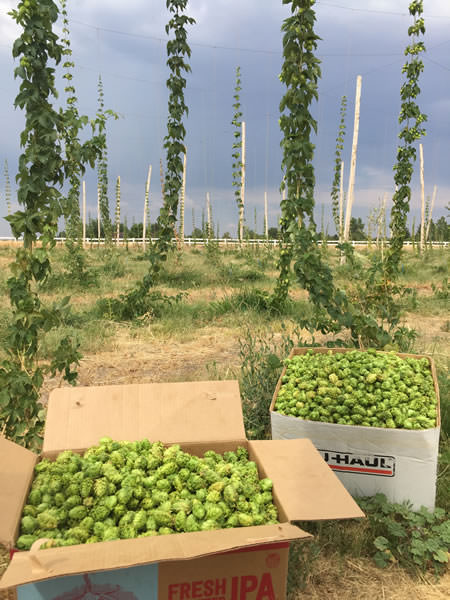cover
HOP-PORTUNITY KNOCKS
Mighty flowers present exciting possibilities for local farmers, brewers, and beer enthusiasts.
WRITTEN BY BARBARA TWITCHELL
PHOTOS BY JAMIE KINGHAM, JEN BRITTON, AND COURTESY OF CHAD AND ELYSA KLEIDOSTY
The real star of this story is a little flower that doesn’t really look like a flower, with an odd name that’s more suitable to a rabbit than a plant — a hop. Small though it may be, it wields a great deal of power in today’s world. That’s because hops are necessary to make a popular and desirable product: beer.
With outstanding antibacterial properties, hops serve as an excellent preservative and stabilizing agent for the beverage. Just as importantly, they provide aroma, flavor, and beer’s characteristic bitterness. There are many hop varieties, each with its own signature taste, scent, and bite, which create the distinctive qualities of particular beers.
But with the recent, unprecedented proliferation of craft breweries and home brewers, it seems hops production has had a hard time keeping up with increasing demand. So a lot of folks in the Reno-Tahoe area are looking to fill the niche.
Hop to it
As the old saying goes, one man’s problem is another man’s opportunity. Jeff Bryant, co-founder of the nonprofit Polygrarian Institute, took that adage to heart.
Bryant is a well-known leader in the local agriculture movement. His work promoting sustainable farming and educating the next generation of eco-conscious farmers has garnered accolades.
Bryant also is a beer enthusiast, a longtime homebrewer, and a certified beer judge, so the hops shortage really got his attention. It only was a matter of time before he found a way for his interest and expertise in each of these worlds to potentially benefit both.
In 2013, Bryant established the High Desert Hops Project to test the viability of hops as a commercial crop for the high desert. Ten varieties were planted on an acre at UNR’s Nevada Agricultural Experiment Station. After three years, Bryant gives hops a big thumbs-up.
“This climate is actually perfect for growing hops,” Bryant says. “They like really hot days and cool nights and mild winters. Year round we have great weather for the plant.”
Unlike the Northwest, where the vast majority of domestic hops are grown, the Reno-Tahoe area has to compensate by irrigating the plants. But even so, Bryant says, utilizing drip irrigation still makes hops a more water-efficient crop compared to Nevada’s typical crop of alfalfa.
In fact, Bryant believes that hops are a lot more viable than alfalfa for our arid climate, from both an ecological and economic perspective.
“An acre of alfalfa uses more water in two or three days than an acre of hops will use all summer,” Bryant says.
Additionally, there are economic advantages.
“With alfalfa, you might make $300 to $400 an acre. With hops, you can probably pull in $15,000 to $20,000 an acre, once they reach full maturity [in about four years], so there’s a big money difference,” Bryant says.
He’s hoping these facts will get some of the local farmers and ranchers to consider giving hops a try.
Hops ENVY
Perhaps it was fitting that one of the first people to establish a commercial hop farm in Nevada was Chad Kleidosty, Bryant’s first intern and project coordinator at the HDH Project.
In 2014, Kliedosty and his wife, Elysa, started Hops ENVY, planting 1,152 hop plants on an acre parcel in Gardnerville.
“After gaining all the experience and knowledge from working on the project,” Kleidosty says, “and seeing all the brewers who were interested in buying a local product, everything seemed to fall into place. We just knew this had to happen.”
The Kleidostys do almost all of the work themselves, which includes everything from setting up the extensive infrastructure to climbing 16-foot ladders to hand harvest the hops from bines (yes, with a b) ranging up to 18 feet tall. They admit it’s been a heavy load, especially since they also work full-time jobs.
Despite the work, the Kleidostys are proud to be regarded as pioneers of commercial hop farming in Nevada, and they remain optimistic. They have used their modest early production to establish a market with local home brewer supply stores and on the web. By next year, they plan to have enough hops to begin supplying one or two local craft breweries. By year four, they hope to be in full production.
“Truth is, we can’t wait until the day we can actually drink a beer made with the hops we’ve grown,” Kleidosty says.
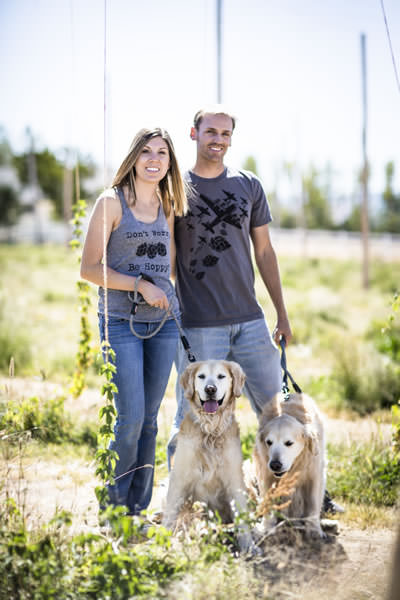
California dreamin’
Gary Romano knows what that feels like, having tasted the fruits of his labors, or, more aptly, the beer of his bines.
Romano is the owner of Sierra Valley Farms in Beckwourth, Calif., a property that has been in his family for almost 80 years. A few years ago, after learning about hops at the Nevada Small Farm Conference in Reno (taking place Feb. 3 – 4 this year), Romano decided to give them a try.
“I had an old photo that shows hops growing on the side of my grandmother’s barn,” Romano says, “so I knew they could grow here.”
They did more than just grow — they exploded. His 350 plants yielded 150 pounds of hops the first year! The second year, production was even stronger.
The Brewing Lair in Blairsden, Calif., was eager to create a brew using the local hops, so Romano, along with a bunch of volunteers, picked and delivered 110 pounds of hops to the brewmaster.
“He made about 500 gallons of local, fresh beer,” Romano says, “and named it Louie, after my father.”
Rumor has it that Louie beer is almost as amazing as its namesake, who turns a youthful 90 this year.
Going loco for local
The Brewing Lair isn’t alone in its eagerness to use local hops. According to the survey done by Bryant for the HDH Project, area brewers expressed a strong desire to purchase local hops, if they were available in sufficient quantity and quality.
Matt Johnson, co-owner and founder of IMBIB Custom Brews in Reno, worked with Bryant to field-test hops grown by the HDH Project in 2015. They made a small batch of each of the 10 hop varieties and had a panel of certified beer judges score them.
“Honestly, all of the hops did quite well,” Johnson says. “And we learned a lot about harvesting and timing that year.”
Encouraged by that experiment, in 2016, they brewed a beer from wet hops picked at the HDH field that day. IMBIB sold it as Juicy Nevada IPA. It turned out to be one of IMBIB’s most popular beers throughout the fall.
Kevin Drake, co-owner and founder of Alibi Ale Works in Incline Village, says he would definitely prefer to source his hops from area growers, but the local production quantity doesn’t come close to meeting his needs.
Drake is fully behind the efforts to grow hops locally, even if he can’t utilize them yet. The last two years, he’s even sponsored a row at Hops ENVY to support the efforts of the farm he hopes will be a future supplier.
In the spirit
While most people associate hops with beer, one local distillery is interested in taking a hard line — adding it to spirits.
Bently Ranch in Minden currently is expanding its operations to include Bently Heritage, a world-class distillery creating fine, handcrafted spirits. And while the remodel of the 100-year-old Minden flour mill, which will house the distillery, won’t be completed until fall of 2017, workers already are barreling products.
Among them are bourbon and vodka, flavored with hops.
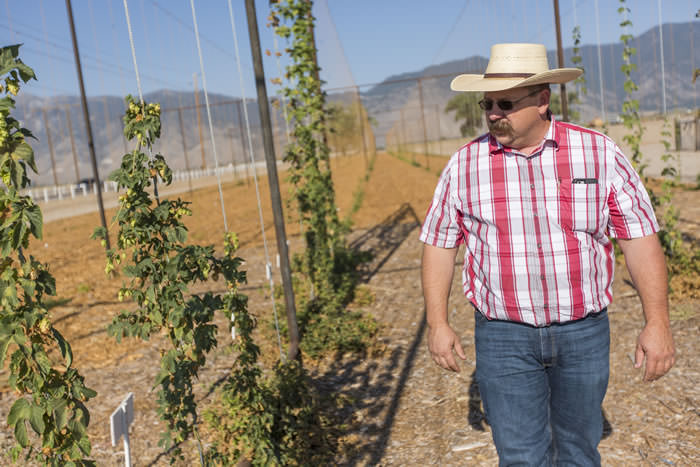
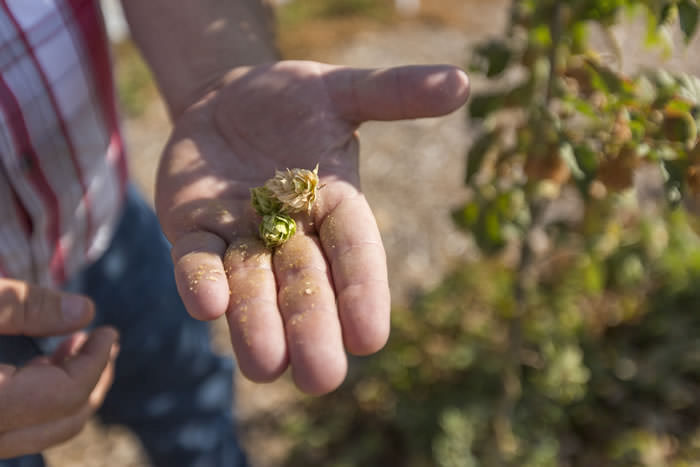
And because this is Bently Ranch — a leader in local ecological and sustainable agricultural practices (see story in edible Reno-Tahoe’s winter 2016 edition) — the folks who run the ranch decided to grow their own. Two years ago, they planted 30 hop rhizomes to meet the distillery’s needs. Last year, recognizing the market for local brewers, they expanded their hop yard to an acre with 1,100 hop plants.
Woody Worthington wears two hats. He is the Bently Ranch operations manager and also serves on the Nevada Department of Agriculture’s Board of Agriculture. He believes hop production holds huge potential for the ranch and the state.
“It’s such a great thing in terms of diversification for farmers and ranchers here,” Worthington says. “We can be creative without spending a lot of money and still be sustainable, and have exports of a product in high demand. Hops are a growing trend that hopefully we can capitalize on.”
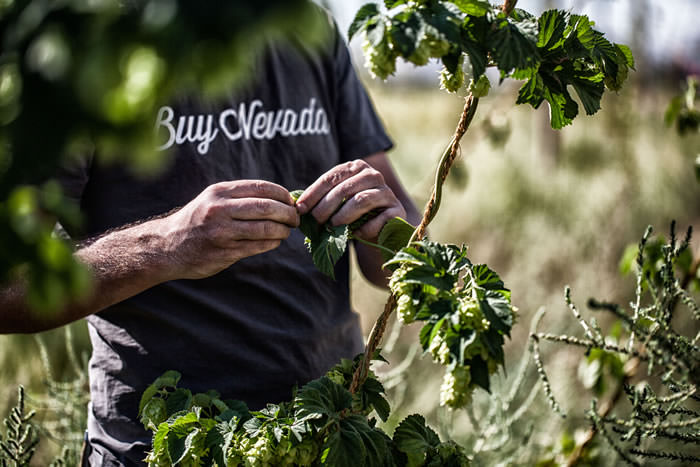
Let’s grow
Jeff Bryant wants to do everything he can to see that happen. With a foot in both worlds, agriculture and brewing, he’s in a great position to help farmers, ranchers, and brewers understand one another’s needs.
He knows that brewers overwhelmingly want their hops dried and pelletized. He already has used grant funding to purchase a pelletizer so that growers can convert their hops into that form.
Additionally, Bryant has procured a grant from the state agriculture department to buy a hops biner for mechanized harvesting, which will eliminate the arduous task of hand picking. Both pelletizer and biner will be available, on loan, to area hop growers by next season.
“They will be game changers for expanding what we can do locally with hops,” Bryant says.
Reno writer Barbara Twitchell admits she never liked beer — that is, until the craft beer revolution pretty much reinvented the product. Now she happily raises an occasional glass to honor all those involved in the creative enterprise.
Resources
It’s so ICKY!
There’s a circumstance where being in a pickle really is a good thing. Just ask Matt Soter, owner of Nevada Brining Co., a business known for putting all sorts of unusual flavorings in the pickles it produces. Its newest culinary additive? Hops!
“Hops are actually a preservative,” Soter says, “and since we are preserving vegetables, we thought, why not create a hops pickle?”
After a handful of failed attempts, he and his team finally hit on a winning formula, incorporating Great Basin Brewing Co.’s award-winning Ichthyosaur ICKY IPA beer into the brine, along with wet hops, and complementing it with the sweetness of organic juniper berries.
The ICKY PICKLE, as it’s called, has become one of Nevada Brining Co.’s most popular products, according to Soter.
“People seem to love it,” he says, “even if they’re not big pickle people.”
Great Basin Brewing Co. has taken this distinct collaboration a step further, and now its menu offers the hugely popular appetizer, Willy Dillys, an ICKY PICKLE dipped in ale batter, deep fried, and served with house-made ranch.
“It’s killer!” Soter says.
ICKY PICKLES are available at many retail outlets and restaurants in the area, as well as online. For details, visit www.Nevadabrining.com.
WRITTEN BY BARBARA TWITCHELL
PHOTOS BY JAMIE KINGHAM, JEN BRITTON, AND COURTESY OF CHAD AND ELYSA KLEIDOSTY
